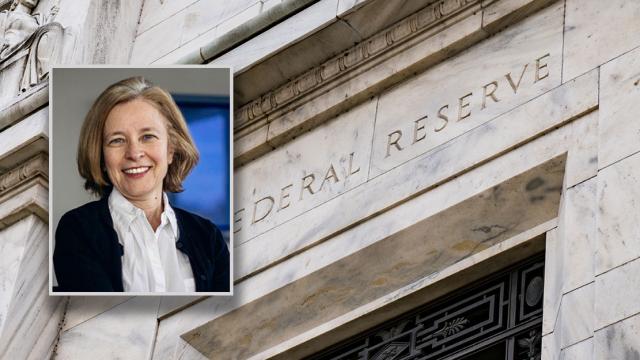
Sen. Joe Manchin’s opposition to Sarah Bloom Raskin’s nomination to vice chairman of the Federal Reserve likely shoots down her confirmation in the Senate. (Source: Paul Brady Photography/Shutterstock.com, Duke Law School)
Sarah Bloom Raskin on March 15 withdrew as President Joe Biden’s nominee to become the top bank regulator at the Federal Reserve, one day after a key Democratic senator and moderate Republicans said they would not back her, leaving no path to confirmation by the full Senate.
“Despite her readiness—and despite having been confirmed by the Senate with broad, bipartisan support twice in the past—Sarah was subject to baseless attacks from industry and conservative interest groups,” Biden said in a statement.
Raskin had become the most contentious of Biden’s five nominees to the Fed’s Board of Governors, generating strong opposition from the outset from Republicans who said she would use the post to steer the Fed toward oversight policies that would penalize banks who lend to fossil fuel companies.
Raskin had been favored by progressive Democrats such as Sen. Elizabeth Warren of Massachusetts, who had pushed Biden to install someone who would pursue stiffer banking oversight after regulatory rollbacks under the previous supervision czar, Randal Quarles.
Her withdrawal clears the way for the Senate to act on the four remaining nominees, which include Jerome Powell for a second term as the central bank’s chair.
Republicans on the Senate Banking Committee, which reviews appointments to the Fed, had blocked progress on the nominations by refusing to attend voting sessions over their objections to Raskin’s nomination as vice chair for supervision.
The panel’s chair, Sen. Sherrod Brown (D-Ohio), said after Raskin’s withdrawal that he would go ahead with holding a vote on the remaining nominees to the seven-member board. They include Lael Brainard, an existing Fed governor, to be the central bank’s vice chair, and economists Philip Jefferson and Lisa Cook for vacant seats.
In a 50-50 Senate that Democrats control only by virtue of Vice President Kamala Harris’s tie-breaking position as the body’s president, Raskin had to secure the backing of every member of her party to gain confirmation.
When Sen. Joe Manchin (D-W.Va), a conservative Democrat from a Republican-leaning state that is among the country’s biggest coal producers, announced his opposition to her—followed by “Nos” from moderate Republicans—her nomination was effectively over.
“Their point of contention was my frank public discussion of climate change and the economic costs associated with it,” Raskin said in her resignation letter. It is “not a novel or radical position,” she wrote, to add climate change to the list of risks the Fed should consider to ensure financial and economic stability.
That is precisely what Republicans argued, with Senate Republican leader Mitch McConnell calling on the White House Tuesday to replace “radical” Raskin with a “suitable” candidate to be the Fed’s vice chair of supervision.
The question for the Biden administration now is whether to pivot toward a moderate for the job or even leave the post open.
The Senate Banking Committee’s top Republican and key architect of the opposition to Raskin, Pat Toomey, said her defeat sends a “message” to financial regulators “that it is not their job to allocate capital or stray from their mission to pursue extraneous or politically charged campaigns.”
The political battle over the nomination came just as the Fed was gearing up for a sea-change in the direction of its monetary policy in the face of inflation running at a 40-year high and now a war in Ukraine that could dent the global economy's recovery from the coronavirus pandemic.
At its two-day meeting this week, Fed officials led by Powell—who continues as the central bank’s chief under the title "Chair Pro Tempore" while awaiting Senate confirmation—are expected to raise interest rates for the first time since 2018 and could detail more of their plans for whittling down the Fed’s nearly $9 trillion in asset holdings.
The move will bring an end to a period of extraordinary accommodation put in place two years ago to shield the economy from the effects of the COVID-19 pandemic, which was then just gaining steam.
The New Yorker magazine first reported that Raskin had submitted a letter of withdrawal to the White House.
Recommended Reading
US Leads Global Oil Production for Sixth Straight Year-EIA
2024-03-11 - The Energy Information Administration says it is unlikely that the record will be broken by another country in the near term.
US Expected to Supply 30% of LNG Demand by 2030
2024-02-23 - Shell expects the U.S. to meet around 30% of total global LNG demand by 2030, although reliance on four key basins could create midstream constraints, the energy giant revealed in its “Shell LNG Outlook 2024.”
Russia Orders Companies to Cut Oil Output to Meet OPEC+ Target
2024-03-25 - Russia plans to gradually ease the export cuts and focus on only reducing output.
Majors Aim to Cycle-proof Oil by Chasing $30 Breakevens
2024-02-14 - Majors are shifting oilfields with favorable break-even points following deeper and more frequent boom cycles in the past decade and also reflects executives' belief that current high prices may not last.
What's Affecting Oil Prices This Week? (Feb. 5, 2024)
2024-02-05 - Stratas Advisors says the U.S.’ response (so far) to the recent attack on U.S. troops has been measured without direct confrontation of Iran, which reduces the possibility of oil flows being disrupted.


